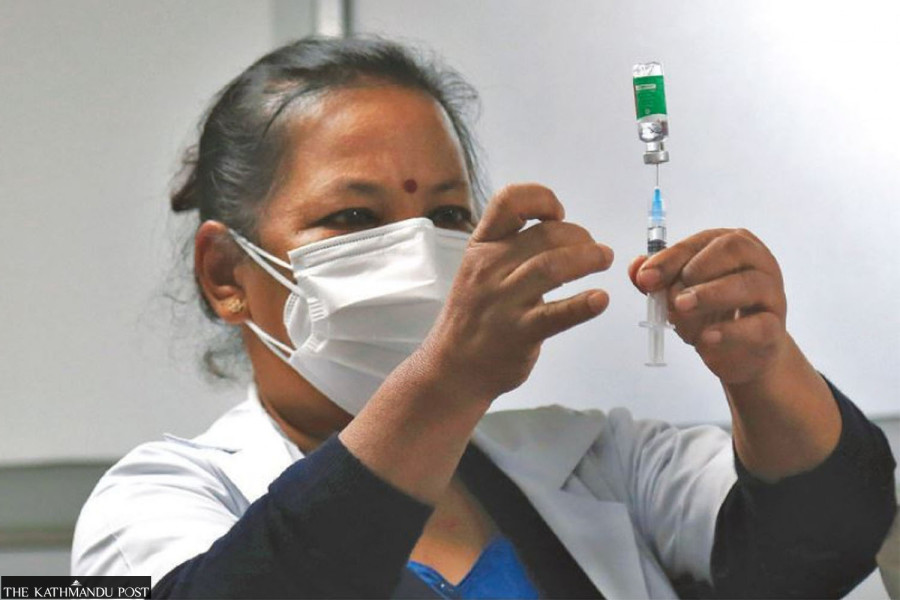Health
Health Ministry asks local units to start Covid booster jab campaign by May 28
Pfizer, Moderna and AstraZeneca vaccines to be rolled out. GAVI is gifting 8.4 million paediatric doses, which will be given to 5-11 year olds.
Arjun Poudel
The Ministry of Health and Population has asked all local units throughout the country to start a booster campaign by May 28.
The request by the ministry comes amid a decline in the uptake of the Covid-19 vaccine.
“All local governments throughout the country will start Covid booster campaign by May 28,” said Sagar Dahal, chief of the National Immunisation Programme. “Local governments can also start the campaign earlier, at their convenience.”
Officials at the Health Ministry said that doses of Pfizer-BioNTech, Moderna and Astrazeneca vaccines have been sent to the districts throughout the country on a needs basis.
The ministry had halted the rollout of the vaccine prior to the local elections, which were held on May 13 throughout the country in a single phase, to prevent the vaccine doses from going to waste.
The Pfizer-BioNTech vaccine doses, which are being stored at minus 80 degrees Celsius in ultra cold freezers, can be kept in normal temperatures (2 to 8 degrees Celsius) for up to 31 days. If not used within 31 days of the rollout, the vaccine doses must be discarded.
The Moderna vaccine also needs to be stored at minus 20 degrees Celsius and can be stored in normal temperatures (2 to 8 degrees Celsius) for up to 31 days. If not used within 31 days of the rollout, Moderna doses too must be discarded.
“We have supplied the vaccine doses in sufficient numbers to the districts and the provinces,” said Dr Surendra Chaurasia, chief of the Logistics Management Section of the Department of Health Services. “We hope that the local governments will start the immunisation campaign at the earliest, as the vaccine doses need to be administered within a certain time frame.”
The government has over 3 million doses of Pfizer-BioNTech, Moderna and AstraZeneca vaccine doses in stock.
Officials hope that administration of the booster shots will help to lessen the risk of Covid-19 outbreaks, and seriousness and deaths from possible infection.
“Everyone above 18 years old who was administered the second doses will be given booster shots, and those above 12 who are not yet vaccinated will be given primary doses, during the campaign,” said Dahal, chief of the National Immunisation Programme.
Earlier in March, the government requested the COVAX facility to halt shipment of the Pfizer-BioNTech vaccine due to storage problems. The facility, the United Nations-backed international vaccine-sharing scheme, had committed to supply 9.2 million doses of the said vaccine, supplied 1.5 million doses in March. The supply of the rest of the doses has been put on hold at the request of the Nepal government.
With a decline in coronavirus cases in the country, very few people are seeking Covid jabs. The Health Ministry had decided to administer booster shots to all who were administered their second doses three months ago, but there has been no significant increase in the uptake.
On Sunday, 17,302 people were vaccinated against Covid.
So far, 19,750,586 people or 67.7 percent of the total population have been immunised against Covid. The Health Ministry said that 5,773,437 people have taken Covid booster shots as of Sunday.
Currently, there are 141 active cases of the coronavirus in Nepal.
The Health Ministry said that there are over 10 million doses of Covid-19 vaccines in stock. Of them, four million doses are the Sinovac-CoronaVac vaccine provided by China in grant assistance. The vaccine doses were supplied in March.
Officials at the Health Ministry said that the Sinovac-CoronaVac Covid-19 vaccine will be rolled out only after all the vaccine doses in stock are used up. The Sinovac-CoronaVac Covid-19 vaccine has a shelf life of two years.
So far the country has received 53,381,570 doses of various vaccines—AstraZeneca, Vero Cell, Moderna, Janssen, Sinovac-CoronaVac and Pfizer-BioNTech.
The Health Ministry said that 8.4 million doses of paediatric Pfizer-BioNtech Covid-19 vaccine have been secured for children between five and 11 years old. According to officials, the Global Alliance for Vaccine and Immunisation has agreed to supply the vaccine doses for free.
“The date for the supply of the vaccine doses has not been confirmed yet, but GAVI will provide us the jabs,” said Dahal, chief of the national immunisation programme. “We hope that the supply will start from June.”
Pfizer-BioNTech’s is the only jab recommended by the World Health Organisation for use in 5-11-year-olds.
The American Association of Pediatrics has recommended administering 10 microgram doses in a gap of 21 days to children aged five to 11. The dose, 0.2ml, is a third of what is administered to adolescents and adults.
The vaccine vial for children in the said age bracket comes with an orange cap while the other vial is purple-capped.
Each vial with 10 doses needs 1.3 millilitres (ml) of diluent under Pfizer’s preliminary plan. The vaccines can be stored for six months in an ultra-cold freezer or 10 weeks in a normal refrigerator, under Pfizer’s proposal.
The US Food and Drug Administration in October authorised emergency use of the Pfizer-BioNTech Covid-19 vaccine for children between five and 11 years.




 11.84°C Kathmandu
11.84°C Kathmandu















